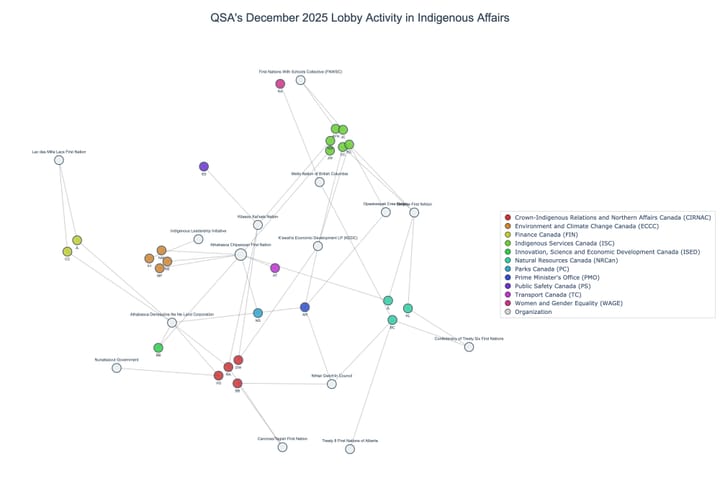QSA's Week in Indigenous Affairs (#39, 2025)
Federal funding for Indigenous clean energy in Quebec; Muscowequan and Assiniboia Residential Schools commemorated; Senate debates Bill S-2 on Indian Act reform, Indigenous economic programs; US EPA approves Navajo Nation Safe Drinking Water Act revision; NAGPRA repatriation updates.

Good morning! This is Queen Street Analytics' weekly roundup of regulatory developments, legislative discussions, political announcements and other government-related news concerning Indigenous communities, First Nations, Inuit, and Métis, and their reserves, territories, and treaty rights. Every Monday, we break down the most important updates in this space in under five minutes.
Want to see GR activities in areas related to Indigenous Affairs? Don’t miss this week’s updates in Social Issues and Environment.
Dates: 2025-09-28 to 2025-10-04
📋 In This Week's Newsletter
• 🏛️ This Week's Parliamentary Committee Calendar
• 🇨🇦 Canadian Federal GR News
• 🇺🇸 US Federal GR News
• 🗺️ Canadian Provincial GR News
• 💬 Government Consultations
• 📚 What We're Reading This Week
This Week's Parliamentary Committee Calendar
- Standing Senate Committee on Indigenous Peoples examines Bill S-2, Indian Act amendments: The Standing Senate Committee on Indigenous Peoples held a meeting on October 1 to study Bill S-2, focusing on citizenship determination, funding, and discrimination in the Indian Act.
- Standing Senate Committee on Agriculture and Forestry assesses wildfire impact and adaptation: On October 2, the committee heard from Matt Gemmel of the Federation of Canadian Municipalities regarding wildfire management, adaptation investment, collaboration with Indigenous communities, and emergency preparedness.
Canadian Federal GR News
Federal Investment in Indigenous-Led Clean Energy Projects in Quebec
On October 3, Natural Resources Canada committed nearly $17 million toward major renewable energy infrastructure in Indigenous communities in Quebec. The funding includes support for the 7.5-megawatt Innavik Remote Hydro Project in Inukjuak, which replaces diesel-generated electricity, and an exploratory study for a 17-megawatt hydroelectric power station at the Matawin dam, a collaboration between Atikamekw and Innu Nations. The Innavik facility is Inuit-owned and is the largest off-grid run-of-river hydro project in Canada, directly serving the needs of Inukjuak's population. Both investments are expected to enhance energy sovereignty and generate revenue streams for the communities involved. The projects are framed as part of the federal government’s broader approach to renewable energy transition and Indigenous economic development.
Sources: Announcements: www.canada.ca

Muscowequan and Assiniboia Residential Schools Commemorated as Historic Sites
The Government of Canada has officially recognized two former residential schools as sites of national significance, with ceremonies and plaque unveilings occurring on October 3 at Muscowekwan First Nation, Saskatchewan, and September 30 in Winnipeg, Manitoba. The Muscowequan Indian Residential School, operating until 1997 and preserved by local survivors, is the last standing facility of its kind in Saskatchewan. Plaques now mark the site, where no fewer than 35 unmarked graves have been located. Similarly, plaques installed at the former Assiniboia Residential School in Winnipeg, operational from 1958 to 1973, honor survivors' experiences and support continued remembrance. Both commemorations respond to Truth and Reconciliation Commission Call to Action 79, and both sites were designated following nominations by Indigenous organizations.
Sources: Announcements: www.canada.ca, Announcements: www.canada.ca
Survivors’ Flag Raised on Parliament Hill to Remember Residential School Experience
On October 1, residential school survivors and First Nations, Inuit, and Métis representatives participated in a flag-raising ceremony on Parliament Hill. The event, attended by Elder Claudette Commanda, the National Centre for Truth and Reconciliation, Governor General Mary Simon, and Crown-Indigenous Relations Minister Rebecca Alty, was intended to honor survivors and remember lost children. The ceremony foregrounded the lasting trauma resulting from the residential school system and reaffirmed Canada’s ongoing commitment to reconciliation. Crisis and wellness support resources were actively circulated to participants and the public in connection with the flag-raising.
Sources: Announcements: www.canada.ca
Federal Statement and Initiatives Mark National Day for Truth and Reconciliation
Senior federal Ministers issued a statement on September 30 memorializing the legacy of residential schools and the ongoing impacts on Indigenous communities. Ministers Guilbeault, Alty, Chartrand, and Gull-Masty underscored the government’s continued actions in partnership with Indigenous leadership to advance the Truth and Reconciliation Commission’s Calls to Action. The statement was made available in multiple Indigenous languages and referenced crisis services and the Hope for Wellness Helpline for survivors and families. The 10th anniversary of the Calls to Action coincided with ongoing efforts to advance projects on cultural and linguistic revitalization and Indigenous-led initiatives.
Sources: Announcements: www.canada.ca
Federal Support for Manitou Stone Rematriation Process in Alberta
Parks Canada and the Manitou Asinîy - Iniskim - Tsa Xani Centre (MAITX) signed a Letter of Intent to explore establishing a permanent home for the sacred Manitou Stone within Elk Island National Park. This process, confirmed at a meeting on September 9 with Minister Steven Guilbeault, will involve joint site and environmental assessments under the Canada National Parks Act. The Stone will remain temporarily at the Royal Alberta Museum, accessible to Indigenous peoples, until a secured cultural facility is constructed. This initiative follows Parks Canada’s regulatory requirements and maintains Indigenous care and stewardship over the Stone.
Sources: Announcements: www.canada.ca
Federal Investment in New Water Treatment Facility at Muskowekwan First Nation
A new water treatment plant was inaugurated at Muskowekwan First Nation, Saskatchewan, on October 1. The 616 sq.-metre facility, supported by $10.96 million in federal funding from Indigenous Services Canada, will deliver potable water through a combination of water lines and truck hauling to rural homes. The infrastructure incorporates advanced filtration technology and addresses both immediate and long-term community needs. The development aims to improve community health outcomes and supports future growth for Muskowekwan First Nation.
Sources: Announcements: www.canada.ca
Federal Statement on Sisters in Spirit Day and National Day of Action for MMIWG and 2SLGBTQI+ People
On October 4, Ministers Alty, Gull-Masty, Chartrand, and Valdez issued a statement reaffirming the government’s commitment to addressing the ongoing national crisis of missing and murdered Indigenous women, girls, and 2SLGBTQI+ people. Recent funding commitments totaling over $8.5 million to the Infinity Women’s Secretariat, along with continued support for the Edmonton 2 Spirit Society and other organizations, were detailed. The statement referenced multi-jurisdictional coordination through the National Indigenous-Federal-Provincial-Territorial Meeting, the National Action Plan to End Gender-Based Violence, and the appointment of the Chief Advisor to Combat Human Trafficking.
Sources: Announcements: www.canada.ca
Senate Discussions: Indigenous Health, MMIWG, and Proposed Legislation
Between October 1 and 2, the Senate undertook a range of discussions relevant to Indigenous affairs, including overrepresentation of Indigenous peoples in incarceration, the need for targeted investments in Indigenous communities, and the adoption of Bill S-228 on forced sterilization. During Question Period, Senator Karetak-Lindell pressed for greater investment in Indigenous infrastructure, and Senator Kim Pate drew attention to the disproportionate number of Indigenous women in prisons. Senator McPhedran raised the matter of the ongoing implementation of recommendations from the National Inquiry into Missing and Murdered Indigenous Women and Girls. These sittings also included debate on bills related to social equity, health, and criminal record management.
Sources: Transcripts: senparlvu.parl.gc.ca, Transcripts: senparlvu.parl.gc.ca
US Federal GR News
EPA Approves Revision of Navajo Nation’s Safe Drinking Water Act Primacy Program
The Environmental Protection Agency (EPA) announced approval of the Navajo Nation’s updated primacy program under the Safe Drinking Water Act on October 2. The revision, which incorporates the federal Public Notification Rule into Navajo law, enables the tribal government to exercise regulatory authority in ensuring safe public drinking water. EPA has verified that Navajo regulations match or surpass federal stringency and received documentation attesting to the enforceability of local laws. Unless a public hearing is requested by November 3, 2025, the program update will become officially effective. Interested parties may access documentation and request public engagement as stated in the Federal Register notice.
Sources: U.S. Federal Announcements: www.federalregister.gov
NAGPRA Repatriation Notices: Brown University and California State University Monterey Bay
Two separate Federal Register notices issued between September 29 and October 1 detail forthcoming repatriation actions under the Native American Graves Protection and Repatriation Act (NAGPRA). Brown University’s Haffenreffer Museum of Anthropology will repatriate four unassociated funerary objects to tribes including the Houlton Band of Maliseet Indians and Penobscot Nation, with items predominantly removed from multiple burial sites in Maine. California State University Monterey Bay intends to repatriate two sacred arrowheads identified as objects of cultural patrimony affiliated with the Pueblo of San Felipe, New Mexico. Cultural consultation processes and public notification procedures remain open to descendant communities as specified in the respective notices.
Sources: U.S. Federal Announcements: www.federalregister.gov, U.S. Federal Announcements: www.federalregister.gov
Receipt of Documented Petitions for Federal Acknowledgment: Utah and Kentucky Tribes
The Department of the Interior reported that the Affiliated Ute Citizens of the State of Utah and the Salyersville Indian Community have filed formal petitions for Federal acknowledgment as American Indian Tribes. The narrative portions of each petition are now available on the Office of Federal Acknowledgment’s website for public review. The Department has established deadlines for comments—October 30, 2025 for the Utah group and January 28, 2026 for the Kentucky (Salyersville) group. Written evidence and comments are sought to aid in the review process, with the notice outlining protocols for public engagement.
Sources: U.S. Federal Announcements: www.federalregister.gov, U.S. Federal Announcements: www.federalregister.gov
USDA Seeks Comments on Infrastructure Grant Programs for Underserved Rural Areas
On October 2, the US Department of Agriculture’s Rural Utilities Service published a request for public comment regarding a revision of the Substantially Underserved Trust Areas (SUTA) initiative's information collection. SUTA provides financial assistance for electric, water, waste, telecommunications, and broadband projects in rural areas, with an aim to maximize services for populations of 10,000 or less. The Water and Environmental Programs division and the Electric Program both administer loans and grants, while the Telecom Program focuses on expanding rural broadband. Stakeholders have until December 1, 2025 to submit comments, as the process will inform evaluation of both community and applicant eligibility.
Sources: U.S. Federal Announcements: www.federalregister.gov
NIGC Removes Dispute Procedure Submission Requirement for Tribal Gaming Ordinances
The National Indian Gaming Commission (NIGC) issued a direct final rule on September 30 eliminating the requirement for tribes to submit copies of procedures for resolving disputes between gaming patrons and tribal or management operators as part of gaming ordinance or amendment submissions. The change, effective December 1, 2025 barring significant adverse comment, aligns submission requirements with statutory authorizations under the Indian Gaming Regulatory Act. Other documentation requirements remain, including criminal background procedures, tribal-state compacts, and agent designations. The rule is intended to simplify the regulatory process for tribal gaming operations without altering key consumer protection frameworks.
Sources: U.S. Federal Announcements: www.federalregister.gov
Canadian Provincial GR News
Tŝilhqot’in Nation’s Child and Family Services Jurisdiction Agreement Extended in BC
The Tŝilhqot’in Nation, together with British Columbia and Canada, has signed an amendment extending their coordination agreement to advance First Nations-led child and family services for five years, including $18.8 million per year in federal funding plus $132 million for infrastructure.
Sources: Provincial Announcement: news.gov.bc.ca
Manitoba Supports 24-7 Safe Space for Indigenous Women in Winnipeg
The Manitoba government announced $3.5 million in funding for Ikwe Widdjiitiwin Inc. to establish the Mino’Ayaawag Ikwewag Lodge, a round-the-clock safe space for Indigenous women facing violence or homelessness, as part of the provincial Mino’Ayaawag Ikwewag strategy.
Sources: Provincial Announcement: news.gov.mb.ca
Ontario Launches $6 Million Indigenous Infrastructure Grant Intake
Ontario opened the annual intake cycle for the Indigenous Community Capital Grants Program, providing grants for Indigenous-led infrastructure projects supporting economic growth and job creation, with applications due November 13, 2025.
Sources: Provincial Announcement: news.ontario.ca
ʼNa̱mǥis First Nation and BC Progress on Joint Forestry Decision-Making Agreement
The Province of British Columbia and ʼNa̱mǥis First Nation have advanced a draft Section 7 joint decision-making agreement under the Declaration Act, introducing a new regime for forest landscape plans within Tree Farm Licence 37, pending consultation until November 2, 2025.
Sources: Provincial Announcement: news.gov.bc.ca
Ontario to Expand Internet Access in First Nations Libraries
Ontario is investing $660,000 through the Internet Connectivity Grant program, ensuring all First Nation public libraries and several additional rural libraries are reimbursed for public internet service costs, with an additional $1.25 million annual supplement for library operations.
Sources: Provincial Announcement: news.ontario.ca
Government Consultations
Public Consultation: Riverside Generating Station Project
The Impact Assessment Agency of Canada is seeking input from Indigenous peoples and the public regarding the summary of the Initial Project Description for the Riverside Generating Station Project, with feedback due by October 6, 2025.
Sources: Canadian Government Consultations: iaac-aeic.gc.ca
What We're Reading This Week
- Indigenous researcher and advocate on economic reconciliation: Current perspectives on advancing Indigenous economic priorities.
- Indigenous Peoples grapple with claims downplaying the history of residential schools: Community reactions to residential school denialism.
- Indigenous equity and economic reconciliation | Edmonton AM: Discussion on economic reconciliation initiatives on CBC.
- 'The world is waiting': Indigenous students absorb cultural history at Manitoba school: Coverage of culture-based education.
- An Indigenous child is being hurt and you can help. Will you?: CBC feature examines child welfare challenges.
- For Indigenous leaders and Canadians, progress toward reconciliation is steady but unfinished: The Globe and Mail reviews reconciliation progress.
- Tanning elk hide is a step toward truth and reconciliation for these Indigenous educators: Story highlights cultural revitalization initiatives in Alberta.
- 'We're still here': Emotions high at opening of museum, once Canada's longest-running residential school | CBC News: Woodland Cultural Centre reopens as a historical museum.
- Indigenous Communities Get New Tools for Housing Crisis as Zachary Knight Enterprises and ClimateDoor Sign Partnership Agreement: Partnership addresses Indigenous housing.
- Indigenous equity and economic reconciliation | Edmonton AM | On Demand | CBC Listen: CBC explores business opportunities for Indigenous communities.


